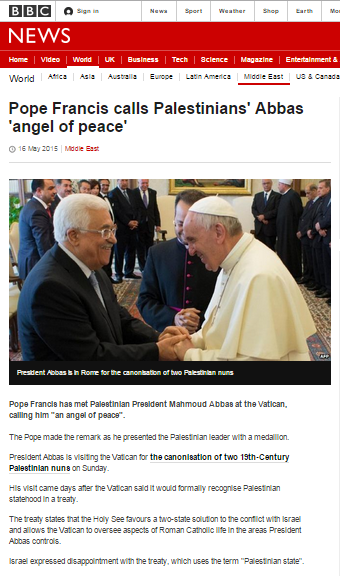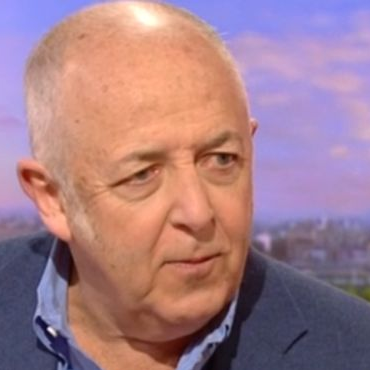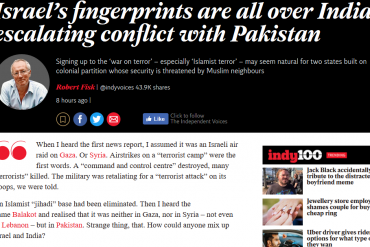Those familiar with the BBC’s record of promoting the recurrent anti-Israel propaganda produced by the anonymous English political activist known as Banksy would not have been in the least bit surprised to find two reports – one written and one filmed – concerning his latest ‘creation’ on the BBC News website’s Middle East page.
On November 1st the website published a written report titled “Balfour Declaration: Banksy holds ‘apology’ party for Palestinians” which opens by telling readers that a location that has been under full control of the Palestinian Authority since 1995 is ‘occupied’ by Israel.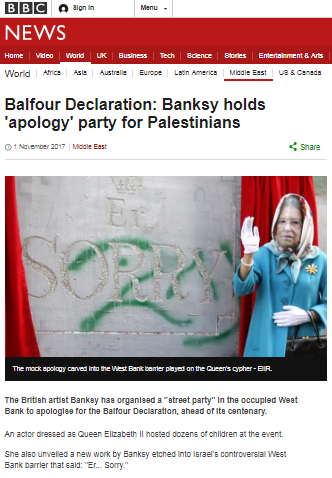
“The British artist Banksy has organised a “street party” in the occupied West Bank to apologise for the Balfour Declaration, ahead of its centenary.”
Readers were also told that the anti-terrorist fence – constructed in order to protect Israeli citizens from Palestinian suicide bombers – is “controversial”.
“An actor dressed as Queen Elizabeth II hosted dozens of children at the event.
She also unveiled a new work by Banksy etched into Israel’s controversial West Bank barrier that said: “Er… Sorry.””
Unsurprisingly, readers were not informed why ‘refugee camps’ (in this case Aida and Dheisheh) still exist over two decades after the PA assumed control of the area.
“Banksy’s tea party in Bethlehem on Wednesday was attended by children from nearby Palestinian refugee camps.”
Readers found a statement from the event’s initiator that echoes a mythical quote used by anti-Israel activists which has previously been seen in BBC content.
“A statement by Banksy said: “This conflict has brought so much suffering to people on all sides. It didn’t feel appropriate to ‘celebrate’ the British role in it.”
“The British didn’t handle things well here – when you organise a wedding, it’s best to make sure the bride isn’t already married.””
The BBC’s portrayal of the Balfour Declaration erased from audience view the part safeguarding “the rights and political status enjoyed by Jews in any other country”.
“The British government’s pledge, on 2 November 1917, was made in a letter by the then Foreign Secretary Arthur Balfour to Lord Walter Rothschild, a leader of the British Jewish community.
It said the government viewed “with favour the establishment in Palestine of a national home for the Jewish people”, so long as it did not “prejudice the civil and religious rights of existing non-Jewish communities”.”
Readers were inaccurately informed that the League of Nations mandate administered by the British “expired” rather than being terminated by the British government. The fact that the armed forces of five Arab countries invaded Israel the day after independence was declared was airbrushed from the BBC’s account, as was the fact that a considerable number of the Palestinian Arabs who left their homes did so on the advice of Arab leaders.
“The Mandate expired on 14 May 1948 and the Jewish leadership in Palestine declared an independent Israeli state. In the Arab-Israeli war which followed, hundreds of thousands of Palestinian Arabs fled or were forced from their homes.”
In all, six of the article’s eighteen paragraphs promoted the PLO/PA’s chosen narrative on the subject of the Balfour Declaration.
“The Balfour Declaration expressed the British government’s support for a Jewish national home in Palestine, paving the way for Israel’s creation.
Israel and Jewish communities view the pledge as momentous, while Palestinians regard it as an historical injustice.” […]
“Palestinians, who see the Balfour Declaration as something that caused decades of suffering and deprived them of their own state on land that became Israel, have called for an apology from the UK ahead of the centenary.”
Readers were not informed that the Palestinians and their Arab patrons rejected the opportunity to have “their own state” on numerous occasions.
A further three paragraphs were devoted to uncritical amplification – including a link – of a Guardian op-ed by Mahmoud Abbas and without any clarification on the part of the BBC that, in contrast to Abbas’ implication, the Balfour Declaration referred to “the civil and religious rights” – not political – of “existing non-Jewish communities in Palestine”.
“Palestinian Authority President Mahmoud Abbas wrote in the Guardian newspaper on Wednesday that the act of signing the letter was not something that could be changed, but that it was something that could be “made right”.
“This will require humility and courage. It will require coming to terms with the past, recognising mistakes, and taking concrete steps to correct those mistakes.”
Mr Abbas said recognising a Palestinian state within the boundaries between Israel and East Jerusalem and the West Bank which existed before the 1967 Middle East war, and with East Jerusalem as its capital, could “go some way towards fulfilling the political rights of the Palestinian people”.”
The filmed report on the same story – titled “‘Er… Sorry’: Banksy’s new West Bank work” – appeared on the BBC News website’s Middle East page on November 2nd and once again BBC audiences were told that a location that has been under complete PA control for over two decades is ‘occupied’.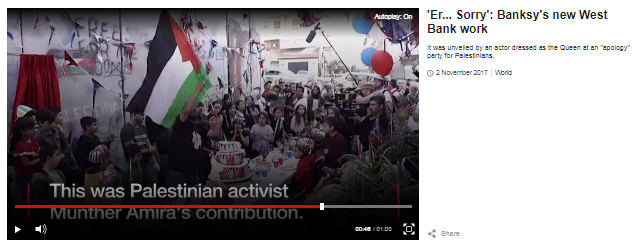
“A new Banksy work in Bethlehem has been unveiled by an actor dressed as the Queen in the Israeli-occupied West Bank. Banksy’s tongue-in-cheek British street party took aim at the British and Israeli governments. They’ve been marking 100 years since the Balfour Declaration – the UK’s promise of a homeland for Jewish people in Palestine.”
The Balfour Declaration of course refers to “a national home for the Jewish people”.
The film went on to once again promote the organiser’s use of a theme derived from a mythical quote.
“The British didn’t handle things well here – when you organise a wedding, it’s best to make sure the bride isn’t already married.”
As viewers saw a man plant a Palestinian flag in a cake, they were told that:
“This was Palestinian activist Munther Amira’s contribution.”
Amira is in fact the director of the ‘Popular Struggle Coordination Committee’ and, according to some news reports, he was protesting the event rather than ‘contributing’ to it.
“People from the nearby Aida refugee camp said afterwards they objected to the way the event had used Palestinian children as the centrepiece of the performance. “We came because we didn’t like the use of the British flags or the way they were using Palestinian children,” said Munther Amira, a prominent activist from Aida who planted a large Palestinian flag in the middle of a cake.”
A clue to the nature of those objections can perhaps be found in the BBC’s written account of the event:
“Instead of paper party hats, they [the children] wore plastic helmets painted with the British flag and riddled with pretend bullet holes.” [emphasis added]
The filmed report closed:
“The British government calls the Balfour Declaration “unfinished business” saying it supports a two-state solution.”
Together with Tom Bateman’s filmed report, these two reports brought the number of items giving one-sided amplification to PA/PLO narrative promoting agitprop on the November 2nd edition of the BBC News website’s Middle East page to three.
Related Articles:
BBC’s Bateman amplifies PLO’s Balfour agitprop
Mahmoud Abbas’s Guardian op-ed illustrates the dishonesty of the ‘Palestinian narrative’ (UK Media Watch)


